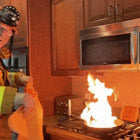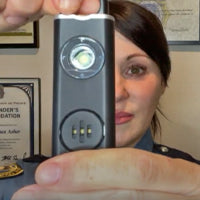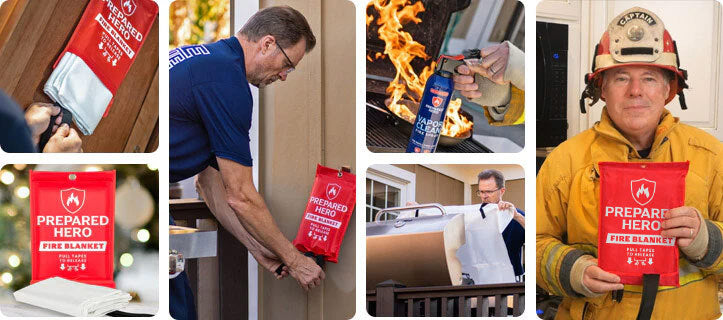Where you put your smoke detectors matters just as much as installing them. Proper placement makes sure they can detect...
Changing your smoke detector battery might seem like a small task, but it’s a big deal for safety. Whether you’re figuring out which battery to use, how often to replace it, or why your smoke detector won’t stop chirping, this guide has you covered.
How to Tell if Your Smoke Detector Needs New Batteries

If you’re not sure if your smoke detector needs new batteries, don’t wait for it to fail. Here are the signs your smoke detector needs new batteries:
1. Watch Out For Chirping or Beeping
A recurring high-pitched chirp that occurs every 30 to 60 seconds usually indicates a low battery. Find out more about why your smoke detector is beeping here.
2. Press the Test Button
Look for the test button. Then, press and hold it for about 30 seconds. If the detector beeps and the sound is loud and clear, the battery works. If the sound is weak or there’s none at all, replace the battery right away.
Test your smoke detectors once a month. Doing this helps identify a dying battery before it becomes a huge problem.
3. Change the Batteries Regularly
Replace your smoke detector’s batteries at least once a year. A good reminder is to do it when you change your clocks for daylight saving time. If your detector uses a sealed 10-year lithium battery, replace the whole unit once it hits the 10-year mark. In some cases, you need to replace them before the said period because smoke detectors can expire faster.
4. Check the Age of Your Detector
Replace your smoke detector as soon as possible if it’s more than 10 years old, battery-powered or not. Older units may not work properly even with fresh batteries. Find out why your smoke detector is beeping with a new battery here.
How to Replace Your Smoke Detector Battery

Here’s a step-by-step guide on how to change your smoke detector battery:
1. Find the Beeping Alarm
Do you hear a chirp? That’s your smoke detector asking for help. Walk around and figure out which one is making noise.
2. Take It Off the Mount
Detach the alarm from its ceiling or wall bracket by twisting it counter-clockwise (or clockwise, depending on the model). You may need a screwdriver if there’s a locking tab.
3. Open the Battery Compartment
Flip the smoke detector over and look for the battery door. Open it gently. Most alarms have it on the back, but some are on the front.
4. Swap the Battery
Remove the old battery and insert a new one. Make sure the positive (+) and negative (-) terminals align with the markings inside. If your alarm requires two batteries, replace both simultaneously.
5. Test Before You Reinstall
Press and hold the test button. You should hear a loud beep. If not, double-check that the battery is in the right way.
6. Reattach the Alarm
Line it up with the bracket, then twist it back on until it clicks into place. If it still chirps after the swap, hold the test button for 30 seconds to reset it. Dust can also cause problems, so give it a quick clean if needed. Find out more about how to stop your smoke detector from beeping unnecessarily here.
Are 9V or AA batteries the Best Battery for Smoke Detectors?
Both 9V and AA batteries are used in smoke detectors, but AA batteries are the more popular choice, and for good reason. While 9V batteries were the standard for years, modern smoke alarms are shifting toward AA batteries because they pack more energy. In fact, AA batteries have about three times the energy capacity of a 9V battery. That means they can last longer and may not need to be replaced as often.
Using AA batteries can be more convenient in the long run. Many newer smoke detectors are designed to run on two or three AA batteries, and some models even use lithium AA batteries that can last up to eight years. That’s a big plus if you want fewer battery swaps.
Whether your smoke detector uses 9V or AA batteries, replace them regularly. According to the National Fire Protection Association (NFPA), a good rule of thumb is to change the batteries every six months or when you change your clocks for daylight saving time. This helps keep your smoke alarm working properly and gives you peace of mind.
While both batteries work, AA batteries work better and last longer than 9V batteries. The type of battery you need also depends on your unit.
What Happens When a Smoke Detector Battery Dies?

A chirping smoke detector isn't just annoying. It’s an important warning. Ignoring a dying smoke detector battery can have serious consequences. Here’s what happens when a smoke detector battery dies:
1. High-Pitched Sounds
The clearest sign your smoke battery’s dying is a high-pitched sound (chirp or beep) every 30 to 60 seconds. That’s your detector saying the battery is low and needs to be replaced.
2. Nonstop Chirping
The chirp or beep will keep going for days, usually about a week, until the battery is replaced or fully drained. It's meant to be annoying, so you can’t ignore it.
3. The Detector Won’t Work
Your smoke detector will stop working if you don’t replace the battery in time. You won’t be warned if there’s a fire, which is a big safety risk.
4. Fire Risk Goes Up
A smoke detector works with carbon monoxide detectors, fire sprinklers, fire blankets, fire sprays, and flame shields to keep your home safe. A dead smoke detector means you won’t get a heads-up if there’s smoke or fire in your home. That can delay your reaction and increase fire risk.
5. Possible End-of-Life Alert
Some modern detectors will beep not just because of a low battery, but to let you know the unit needs to be replaced as well. Smoke detectors last for up to 10 years.
Why Does My Smoke Detector Go Through Batteries So Fast?

Is your smoke detector going through batteries way too fast? There’s probably a reason behind it. From battery quality to cold spots in your home, here are common reasons why your smoke detector goes through batteries fast:
1. Low-Quality or Faulty Batteries
Not all batteries are created equal. Cheaper ones often don’t last as long, especially in modern smoke detectors that constantly check the air. Some batteries are also not reliable enough or near the end of their life, right out of the pack. Stick to proven and certified brands if you want batteries that last long.
2. Temperature Changes
Cold temperatures can drain batteries faster than you’d expect. If your smoke detector is near a drafty window or in an unheated hallway, the cold temperature, especially at night, can mess with your batteries. Even good batteries seem to die early in a colder spot.
3. Smoke Detector Problems
Sometimes it’s not the batteries, but the smoke detector itself. If the internal parts are starting to wear out, they can pull more power than they should. Smoke detectors also have a lifespan of about 10 years. After that, they start acting up and draining the batteries quicker.
What Kind of Battery Does a Smoke Detector Take?
Smoke detectors usually run on a nine-volt (9V) battery or AA batteries. For a long time, 9V was the standard, especially in older models. But today, many newer smoke detectors use two or three AA batteries instead. Some even come with built-in, sealed lithium batteries that last up to 10 years. These are great if you want something low-maintenance. Since different models use different power sources, it’s always smart to check the label or manual so you know exactly what kind of battery you need.
How Do I Make My Smoke Detector Stop Saying Low Battery?

If your smoke detector won’t stop beeping about a low battery, here’s what to do. Start by replacing the old battery with a new, correctly installed one of the proper type. If the beeping persists, press and hold the test button for 15-30 seconds to reset the alarm and clear any residual charge. If chirping continues, the smoke detector may be too old and require full replacement; check its manufacture date..
Can I Replace the Smoke Detector Battery Myself?
Yes, you can replace the smoke detector battery by yourself. Just twist the detector off its mount, replace the old battery with a new one (most commonly 9V or lithium), and twist it back into place. You can find these batteries at any hardware store. Find out more about changing your smoke alarm battery here.
How Often Should I Replace a 9-Volt Battery in a Smoke Detector?

You should replace the 9-volt battery in your smoke detector at least once a year. But many safety experts, including the National Fire Protection Association (NFPA), suggest changing it every six months. A good habit is to do it when you change your clocks for daylight saving time. That way, you won’t forget. It’s also smart to test your smoke detector every month just to make sure it’s still working. A few minutes of maintenance can help keep your home and family safe.
Will Any 9V Battery Work In a Smoke Detector?
Yes, most standard 9V batteries will work in a smoke detector. You can also use a high-quality alkaline 9V battery if you want something more reliable and long-lasting. Cheaper ones run out faster. You should also make sure your unit doesn’t need AA or sealed batteries. If this is the case, 9V batteries won’t work.
Conclusion
Keeping your smoke detector in good shape doesn’t take much. You just need the right batteries, do regular checks, and get a quick swap when needed. A working smoke alarm gives you peace of mind and a heads-up in case of fire. So, don’t wait for it to chirp endlessly or fail when it matters most. Stay on top of battery changes, test monthly, and replace the unit when it’s time.
Do you want reliable, easy-to-use, and affordable tools to put out small fires before they spread? Check out Prepared Hero’s fire prevention tools here, and get up to 51% off on certain items. Stay prepared, hero!


 Fire
Fire Safety
Safety Survival
Survival Protection
Protection New
New
 Fire
Fire Safety
Safety Survival
Survival Protection
Protection New
New












